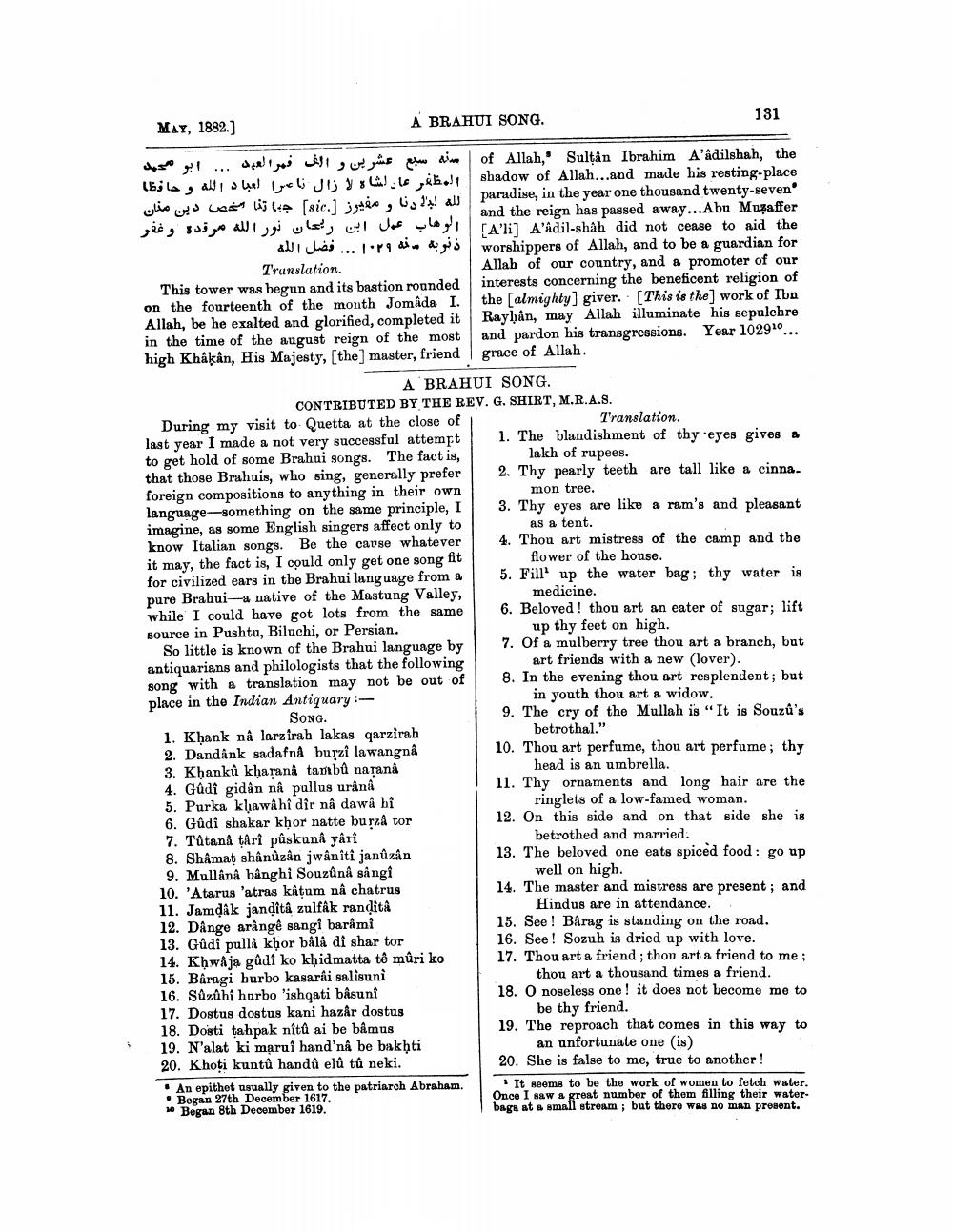________________
MAY, 1882.]
A BRAHUI SONG. of Allah, Sultan Ibrahim A'âdilshah, the shadow of Allah...and made his resting-place paradise, in the year one thousand twenty-seven and the reign has passed away...Abu Muzaffer [A'li] A'âdil-shâh did not cease to aid the worshippers of Allah, and to be a guardian for Allah of our country, and a promoter of our interests concerning the beneficent religion of the [almighty] giver. [This is the] work of Ibn Rayhân, may Allah illuminate his sepulchre and pardon his transgressions. Year 102910... grace of Allah.
و حافظا
سنه سبع عشرين و الف فمرالعيد ... ابو محمد المظفر عاد لشاه لا زال نارا لعباد الله لله لبلادنا و مفيوز [.sic] جا تنا مخص د بن منان الوهاب عمل ابن ریحان نور الله مرقدة وغفر ذنوبه سنه ۱۰۲۹ ... فضل الله
Translation.
This tower was begun and its bastion rounded on the fourteenth of the month Jomâda I. Allah, be he exalted and glorified, completed it in the time of the august reign of the most high Khakân, His Majesty, [the] master, friend
A BRAHUI SONG. CONTRIBUTED BY THE REV. G. SHIRT, M.R.A.S.
During my visit to Quetta at the close of last year I made a not very successful attempt to get hold of some Brahui songs. The fact is, that those Brahuis, who sing, generally prefer foreign compositions to anything in their own language-something on the same principle, I imagine, as some English singers affect only to know Italian songs. Be the cause whatever it may, the fact is, I could only get one song fit for civilized ears in the Brahui language from a pure Brahui-a native of the Mastung Valley, while I could have got lots from the same source in Pushtu, Biluchi, or Persian.
So little is known of the Brahui language by antiquarians and philologists that the following song with a translation may not be out of place in the Indian Antiquary:
SONG.
1. Kḥank na larzirah lakas qarzirah 2. Dandank sadafná burzi lawangnâ 3. Khankû kharanâ tambû narana 4. Gûdî gidân nå pullus urânâ
5. Purka klawâhî dîr na dawâ hî
6. Gûdi shakar khor natte burzâ tor 7. Tutanâ țârî pûskunâ yârî
8. Shâmat shânûzân jwânîtî janûzân 9. Mullânâ bânghi Souzûnâ sângî 10. 'Atarus 'atras kâtum nâ chatrus 11. Jamḍak janditâ zulfák randitâ 12. Dânge arângê sangi barâmi 13. Gûdî pullà khor bâlâ dî shar tor 14. Khwaja gûdi ko khidmatta tê mûri ko 15. Bâragi burbo kasarâi salisunì
16. Sûzûhî harbo 'ishqati bâsunî
17. Dostus dostus kani hazår dostus
18. Dosti tahpak nîtů ai be bâmus 19. N'alat ki maruî hand'nâ be bakḥti 20. Khoți kuntû handû elû tû neki.
131
An epithet usually given to the patriarch Abraham. Began 27th December 1617.
10 Began 8th December 1619.
Translation.
1. The blandishment of thy eyes gives a lakh of rupees.
2. Thy pearly teeth are tall like a cinna mon tree.
3. Thy eyes are like a ram's and pleasant as a tent.
4.
Thou art mistress of the camp and the flower of the house.
5. Fill up the water bag; thy water is medicine.
6. Beloved! thou art an eater of sugar; lift up thy feet on high.
7. Of a mulberry tree thou art a branch, but art friends with a new (lover).
8. In the evening thou art resplendent; but in youth thou art a widow.
9. The cry of the Mullah is "It is Souzû's betrothal."
10. Thou art perfume, thou art perfume; thy head is an umbrella.
11. Thy ornaments and long hair are the ringlets of a low-famed woman.
12. On this side and on that side she is betrothed and married.
13. The beloved one eats spiced food: go up well on high.
14. The master and mistress are present; and Hindus are in attendance.
15. See! Bârag is standing on the road.
16. See! Sozuh is dried up with love.
17. Thou art a friend; thou art a friend to me; thou art a thousand times a friend.
18. O noseless one! it does not become me to be thy friend.
19. The reproach that comes in this way to an unfortunate one (is)
20. She is false to me, true to another!
It seems to be the work of women to fetch water. Once I saw a great number of them filling their waterbaga at a small stream; but there was no man present.




